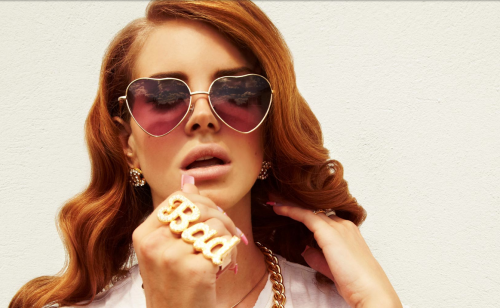
In her new song for The Great Gatsby soundtrack called “Young and Beautiful,” Lana del Rey sings about her two favorite topics—love and death. In the music video, the ever-glamorous, ever-pouty del Rey asks the hypothetical guy she is singing to, “Will you still love me when I’m no longer young and beautiful?” These lyrics are classic Lana, but in the third verse things get interesting:
Dear Lord, when I get to heaven
Please let me bring my man
When he comes tell me that you’ll let him in
Father tell me if you can
All that grace, all that body
All that face makes me wanna party
He’s my sun, he makes me shine like diamonds
I was struck by some of del Rey’s overtly religious lyrics in her album Born to Die, which came out last year. In the title track, two lines are borrowed from the hymn “Amazing Grace,” as del Rey opens the second verse by singing (again to her man), “Lost but now I am found/I can see but once I was blind.” But del Rey’s dark take on love does much more than place a tattooed James Dean type in the role of savior (or A$AP Rocky in the role of JFK?). In her version of love, Lana gives her heart away to a reckless bad boy, and the result is always death, heartbreak, or both.
 Del Rey has been criticized as being anti-feminist, resurrecting through her 60’s style and Betty Draper-like image “a version of femininity that few thought needed reclaiming.” In a New York Times’ Op-Ed, Refe Tuma says of del Rey, “Her persona is infused with a timely mix of over-realized drama, sexuality and more than a hint of self-directed misogyny.” Pitchfork harshly said, “You’d be hard pressed to find any song [on Born to Die] on which Del Rey reveals an interiority or figures herself as anything more complex than an ice-cream-cone-licking object of male desire.” In other words, del Rey has less agency than a can of beans. The criticism that del Rey received when she first jumped into stardom is enough to make any young woman without a death obsession feel insecure, but many of the critics concerned with the album’s patriarchal overtones make good points.
Del Rey has been criticized as being anti-feminist, resurrecting through her 60’s style and Betty Draper-like image “a version of femininity that few thought needed reclaiming.” In a New York Times’ Op-Ed, Refe Tuma says of del Rey, “Her persona is infused with a timely mix of over-realized drama, sexuality and more than a hint of self-directed misogyny.” Pitchfork harshly said, “You’d be hard pressed to find any song [on Born to Die] on which Del Rey reveals an interiority or figures herself as anything more complex than an ice-cream-cone-licking object of male desire.” In other words, del Rey has less agency than a can of beans. The criticism that del Rey received when she first jumped into stardom is enough to make any young woman without a death obsession feel insecure, but many of the critics concerned with the album’s patriarchal overtones make good points.
In a review of Born to Die, Slant Magazine said, “The songs on her new album, Born to Die, aren’t only small—they’re powerless. Which is to say, she writes about women who are unhinged and consumed by the love their men provide.” At the end of the music video for the song “Born to Die,” del Rey is killed in a car crash and lies, covered in blood, in her lover’s arms. In the song “Video Games,” she sings that it’s “only worth living if somebody is loving you.” In “Radio,” she begs, “Baby, love me ‘cause I’m playing on the radio.” Despite all the flack, Del Rey’s lyrics imply what we all tend to believe, that beauty (or something) earns love, and death naturally follows on the heels of such a time-bound, law-bound equation. And because any love that is not a gift requires an exchange, Lana del Rey offers herself, body and soul, in exchange for love. She loves to be broken, but she refuses to be a mess; her image and her beauty are the contingencies she has to offer. She gives her flawless, airbrushed femininity in exchange for a messy love that is doomed because it is only alive while she is “young and beautiful.” Embracing this kind of love, we all know, means embracing death, no matter how well dressed she is (and she has impeccable style).
In beautiful contrast, the love that God offers is tied neither to beauty nor time. We don’t need to offer anything to receive God’s love and so we are, therefore, allowed to be complete messes, born not for death but for life. And thank God, because who has the time or the wallet to look as good as Lana?

COMMENTS
4 responses to “Dying to Be Loved: Lana del Rey’s Tragic Bleeding Heart”
Leave a Reply














Amazing post! Thank you.
Written beautifully:) you are one of very few to understand Lana!
I am a such a big fan!!
I understand that with the feminism in today’s society, the way that Lana portrays herself in her songs and her message to women is likely to be criticized. I love uplifting artists like Beyonce who are all about independence, girl power, and not needing a relationship to define yourself. But I can identify with Lana as well. She’s obsessed with love and relationships and all she wants is to be loved by a man. She’s a hopeless romantic and there are still many women these days who are like that. It’s a classic theme, especially from the 1960’s genre that she often alludes to. Being a hopeless romantic doesn’t always mean that this woman is pathetic and dependent. There is a classic beauty to this type of love. I know that it’s not parallel with the feminist view that is popular in today’s culture, but that’s Lana’s view. Neither types of views are bad. But Lana offers a soundtrack to women that are maybe going through a break up and just want to cry to sad love songs. And then they go and become empowered by Beyonce.